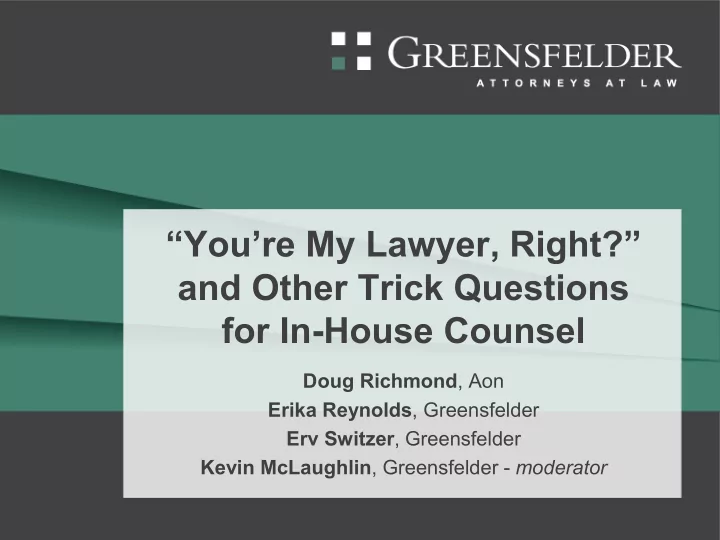

“You’re My Lawyer, Right?” and Other Trick Questions for In-House Counsel Doug Richmond , Aon Erika Reynolds , Greensfelder Erv Switzer , Greensfelder Kevin McLaughlin , Greensfelder - moderator
What if the CEO/boss asks for personal legal advice? • Who wants to tell the boss “I can’t help you”? • Assume the conversation is not privileged, or get Bar Plan coverage and talk about it after hours or over lunch off of company property. • Before undertaking a joint representation of an organization and an associated individual, counsel should evaluate whether the individual’s conduct and interest are consistent with the company’s.
Yanez v. Plummer • For in-house lawyers, it should be as familiar to you as Miranda v. Arizona . – Employee Yanez (witness to co-employee’s work injury) sued in-house counsel Plummer – Plummer had defended Yanez’s deposition and pointed out contradictions in his written statements • There can be conflicts between employee- clients and employer-client. • Does the in-house counsel have insurance?
Upjohn warnings • Is the employee a client or not? • It may depend on who is asking.
“Soliciting” employees to be their counsel for purposes of Rule 4.2 • Calling employees or former employees and saying “Do you want me to be your lawyer? The company will pay my fees.” • Some courts frown on that as violating soliciting rules and subverting informal discovery and the intent of Rule 4.2.
“Soliciting” employees to be their counsel for purposes of Rule 4.2 • Rivera v. Lutheran Med. Ctr ., 22 Misc. 3d 178, 185 (N.Y. Sup. Ct. 2008) (Lawyer violated the Code in soliciting employee witnesses as clients) • Matusick v. Erie County Water Auth ., 2010 U.S. Dist. LEXIS 15161 (W.D.N.Y. Feb. 22, 2010) (“Defendants’ counsel shall not solicit to represent any non-party non-policymaking ECWA employee at a deposition or meeting with plaintiff's counsel.”) • Aspgren v. Montgomery Ward & Co ., 1984 U.S. Dist. LEXIS 20927 (N.D. Ill. Dec. 27, 1984) (Court prohibited counsel from telling former employees that organization would pay for counsel at deposition until after the former employee decided he/she needed representation.)
The Penn State ethics case • Penn State general counsel was recommended for discipline based on treating the president and vice president as clients, even though she told them her client was the organization • Purported confusion by the executives as to GC’s capacity led to criminal charges against them being dropped. http://www.abajournal.com/news/article/former_penn_state_general_counsel_is _cleared_of_ethics_violations_in_sandus
Casual conversations and legal representation • Make sure privilege or work product is not waived by consulting with colleagues or friends. • In law firms, it is much more clear that there is no waiver by consulting with other members of the firm. • In a corporate law department, silence on the issue leaves ambiguity.
Recommend
More recommend